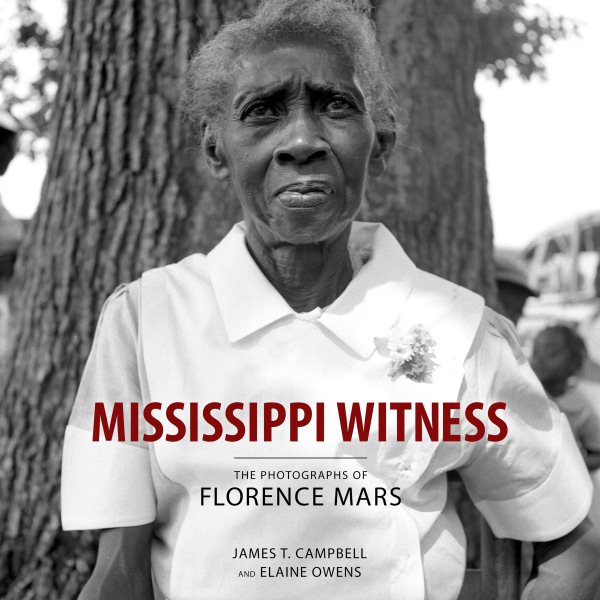By Jim Ewing. Special to the Clarion-Ledger Sunday print edition (February 24)
Many recall Florence Mars from her groundbreaking book Witness in Philadelphia, her personal account of the upheaval that surrounded her native Philadelphia, Mississippi, in the wake of the murder of three civil rights workers in 1964.
 But perhaps little known until now with the publication of Mississippi Witness: The Photographs of Florence Mars, it’s revealed that Mars was a talented photographer, as well.
But perhaps little known until now with the publication of Mississippi Witness: The Photographs of Florence Mars, it’s revealed that Mars was a talented photographer, as well.
James T. Campbell, a Stanford University professor, writes in an excellent introduction to the photos that Mars only started photographing her surroundings after the landmark U.S. Supreme Court ruling in Brown v. Board of Education outlawing separate but equal schools. Mars writes that she recognized that the world in which she was living was soon to be a thing of the past and wanted to capture it on film.
The photos, curated by Elaine Owens, recently retired from the Mississippi Department of Archives and History, were mostly taken from 1954 to 1964.
Mars was not a professional photographer, though she exhibits mastery of the form in her work. Rather, she was born into relative wealth in Neshoba County, her family owning thousands of acres of land, a livestock auction, and a mercantile business in the county seat.
Like Eudora Welty, a writer who also picked up a camera and chronicled the people, places and things around her during the Depression two decades before, she applied her own knowledge and interests to her work. And, like Welty, the photos were published in definitive form only years after they were taken.
As Campbell writes, the “similarities in their circumstances and sensibilities are obvious. Single white women, they lived at once inside and outside the confines of the conservative, racist, patriarchal society. Solitary by nature, both understood the yearning for connection. Acutely observant, both saw the wonder in ordinary life, the aching beauty that survived the ugliness.”
Many of the photos are simply haunting. While most are portraits without name, background or explanation, they are environmental in that the elements of the photos tell a great deal—perhaps more than simple words can tell.
For example, one shows a young black girl facing the camera in a cotton field where the stalks tower over her. At her feet, dragged behind, is a cavernous cotton sack filled to near bursting by the bolls she has picked, perhaps weighing as much as herself. The expression on her face is at once sad and defiant, resigned, proud and beaten. It is the face of a child living the life of a hardworking adult, too young to be careworn, too old to be that of a child.
In another, a young black woman is washing clothes in a galvanized tub, her hands gnarled by the work, her face a portrait in stoicism, scrubbing out dirt.
Others include:
- White jurors taking a break in the Emmett Till trial, which Mars attended. Their casual, exasperated looks don’t exactly telegraph a fair hearing.
- A white performer in grinning black face entertaining lounging white farmers in overalls at the stockyard at Philadelphia.
- A young black woman washing naked white children on a porch at the Neshoba County Fair, 1955. In the notes section at the end of the book, the authors relate that Mars had penciled a caption on the back of the print: “Certain things are taken to be self-evident.”
Mars, Campbell writes, stopped taking photos after the civil rights workers were killed, as “the tense atmosphere made photography difficult.” In its stead, Mars confided “writing took over from the photography in the middle of my life.”
Her Witness in Philadelphia was published in 1977. She died in 2006.
Mars’ photographs are as she intended, an enduring testament to a time in Mississippi long gone. Printed on heavy stock in a large format, they are a rare treasure.
Jim Ewing, a former writer and editor at the Clarion Ledger, is the author of seven books including his latest, Redefining Manhood: A Guide for Men and Those Who Love Them.
James T. Campbell and Elaine Owens will be at Lemuria on Wednesday, February 27, at 5:00 p.m. to sign copies of and discuss Mississippi Witness.


Comments are closed.